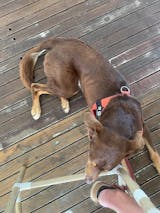Holiday Hazards: How to Keep Your Pet Safe
Keep Your Pets Safe During the Holiday Season
The holiday season is a time of celebrations, family gatherings, and festive treats. While the festivities bring joy, they also introduce potential hazards for pets. It’s important for pet parents to proactively protect their furry friends to ensure they have a safe and stress-free holiday.
In this blog, we’ll explore common holiday risks and share practical tips to keep your pets protected and happy.
Fireworks Safety
While fireworks can be thrilling for humans, they often cause stress and anxiety in pets due to the loud noises, bright lights, and unfamiliar scents. Here’s how to keep your pet calm during fireworks displays:
- Create a Safe Haven: Choose a quiet, enclosed room, such as a bedroom or bathroom, where your pet can retreat. Use curtains or blankets to muffle noise and provide familiar items like their favorite toys, blanket, and bed to create a comforting space.
- Use Calming Aids: Consult your veterinarian about calming products, such as pheromone diffusers, treats, or supplements designed to reduce anxiety.
- Distract with Activities: Interactive toys or puzzle feeders can help divert your pet’s attention from the noise. Spending time playing or cuddling with them also provides reassurance.
- Avoid Leaving Pets Alone: If possible, stay with your pet during fireworks. If you can’t, consider boarding them at a quiet, pet-friendly facility.
- Seek Professional Help: For pets with severe anxiety, consult a veterinarian, animal behaviorist, or professional trainer for tailored strategies or medication options.
Holiday Plant Hazards
Festive plants can brighten up your home, but many are toxic to pets if ingested. Common holiday plants to watch out for include:
- Poinsettias: Can cause mild stomach upset if consumed in large quantities.
- Lilies: Highly toxic to cats, even in small amounts, potentially causing kidney failure.
- Mistletoe: May lead to vomiting and diarrhea in pets.
Safety Tips:
- Keep plants out of your pet’s reach (e.g., on high shelves).
- Research the toxicity of plants before purchasing them.
- Consider artificial plants to eliminate the risk of poisoning.
Food Safety
Holiday treats are tempting for pets, but many human foods can be dangerous—or even fatal—for them. Key culprits include:
- Chocolate: Contains theobromine, which can cause vomiting, rapid heart rate, seizures, or death in pets.
- Grapes and Raisins: Can trigger acute kidney failure in dogs, even in small amounts.
- Onions and Garlic: Contain thiosulfates, which damage red blood cells and may lead to anemia.
- Xylitol: Found in sugar-free products, it can cause hypoglycemia and liver failure in dogs.
Prevention Tips:
- Avoid giving pets table scraps or human food.
- Consult your veterinarian before offering any holiday treats to ensure they’re safe.
- Keep hazardous foods out of reach and educate guests about what your pets can and cannot eat.
By taking these precautions, you can protect your pets from potential holiday hazards, ensuring they stay safe and stress-free during the festive season. After all, the holidays are more enjoyable when the whole family—including your furry companions—can celebrate happily and healthily!


























